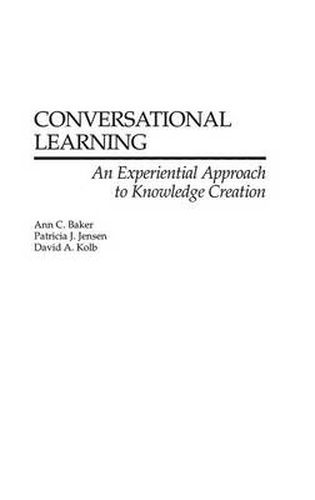Readings Newsletter
Become a Readings Member to make your shopping experience even easier.
Sign in or sign up for free!
You’re not far away from qualifying for FREE standard shipping within Australia
You’ve qualified for FREE standard shipping within Australia
The cart is loading…






Shows how conversations can not only facilitate learning within organizations, but actually create the subject of learning: knowledge itself. Despite different belief systems and other complex, divisive problems, people can still learn from each other and in doing so, create new knowledge. The medium is conversation. The authors of this challenging new book make clear that business conversations can be seen as social experiences. Through them we discover new ways of seeing the world, and this in turn helps destroy barriers between us. When that happens new knowledge can emerge or be developed. Well illustrated with case studies to demonstrate the practical value of conversational learning in variously diverse organizational settings, the authors provide the guidance we need. They shift the emphasis from the more common prescriptive techniques that are essentially insensitive to different contexts, attitudes, beliefs, and instead elaborate a theory of learning that is more social and interactive. When done, we get a remarkable new source of explanatory theory to validate an intensely pragmatic way to help organizations get people talking to each other–and by doing so, advance the well-being not only of their organizations but, equally important, the well-being of themselves in them. The authors begin by asking, how can people learn from their differences and not be divided by them? One way is by creating conversational spaces, areas where conversation takes place. The authors show how such spaces are created, maintained, and enhanced, and how they are used to transform different interpretations and perspectives into new common understandings. That the author’s theoretical approach is well grounded in empirical research is proven by their detailed case studies, all of them drawn from individual and collective experiences. Their purpose: to influence academics and practitioners to move beyond pure rationalism, and to recognize and value more highly the interactive, social dimensions of learning. To accomplish this they provide guidelines and a conceptual foundation for a more comprehensive approach to learning. They stimulate recognition that the often undervalued resource of conversation is actually an important opportunity to facilitate learning. In fact, it may be the best way within organizational settings to create its own purpose: the creation of knowledge itself.
$9.00 standard shipping within Australia
FREE standard shipping within Australia for orders over $100.00
Express & International shipping calculated at checkout
Shows how conversations can not only facilitate learning within organizations, but actually create the subject of learning: knowledge itself. Despite different belief systems and other complex, divisive problems, people can still learn from each other and in doing so, create new knowledge. The medium is conversation. The authors of this challenging new book make clear that business conversations can be seen as social experiences. Through them we discover new ways of seeing the world, and this in turn helps destroy barriers between us. When that happens new knowledge can emerge or be developed. Well illustrated with case studies to demonstrate the practical value of conversational learning in variously diverse organizational settings, the authors provide the guidance we need. They shift the emphasis from the more common prescriptive techniques that are essentially insensitive to different contexts, attitudes, beliefs, and instead elaborate a theory of learning that is more social and interactive. When done, we get a remarkable new source of explanatory theory to validate an intensely pragmatic way to help organizations get people talking to each other–and by doing so, advance the well-being not only of their organizations but, equally important, the well-being of themselves in them. The authors begin by asking, how can people learn from their differences and not be divided by them? One way is by creating conversational spaces, areas where conversation takes place. The authors show how such spaces are created, maintained, and enhanced, and how they are used to transform different interpretations and perspectives into new common understandings. That the author’s theoretical approach is well grounded in empirical research is proven by their detailed case studies, all of them drawn from individual and collective experiences. Their purpose: to influence academics and practitioners to move beyond pure rationalism, and to recognize and value more highly the interactive, social dimensions of learning. To accomplish this they provide guidelines and a conceptual foundation for a more comprehensive approach to learning. They stimulate recognition that the often undervalued resource of conversation is actually an important opportunity to facilitate learning. In fact, it may be the best way within organizational settings to create its own purpose: the creation of knowledge itself.